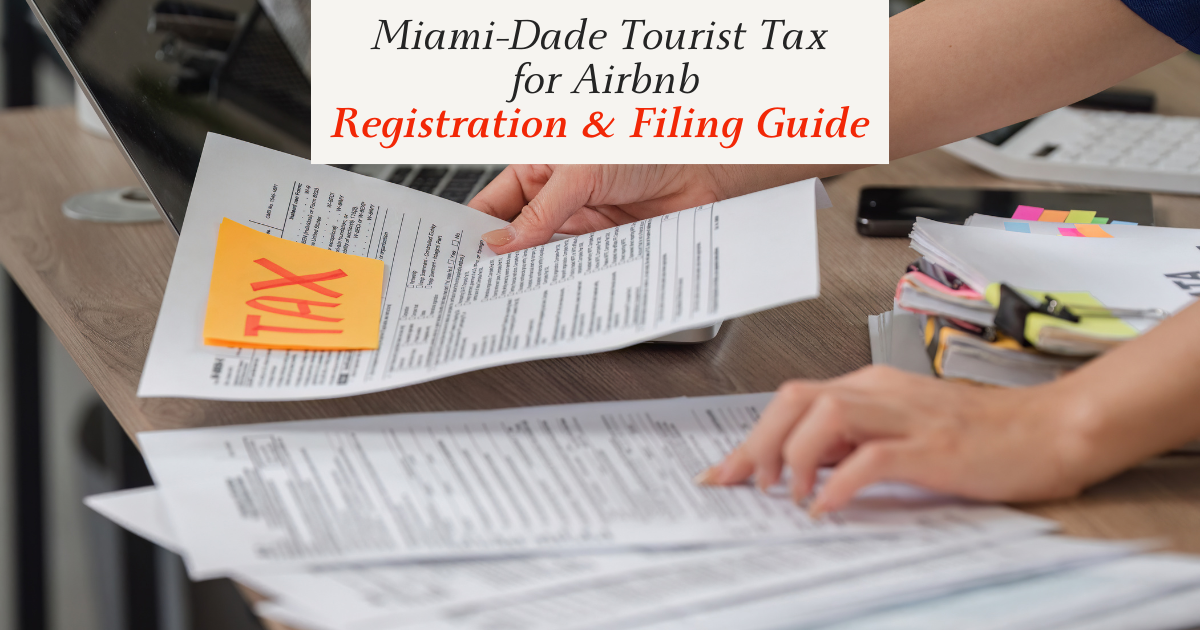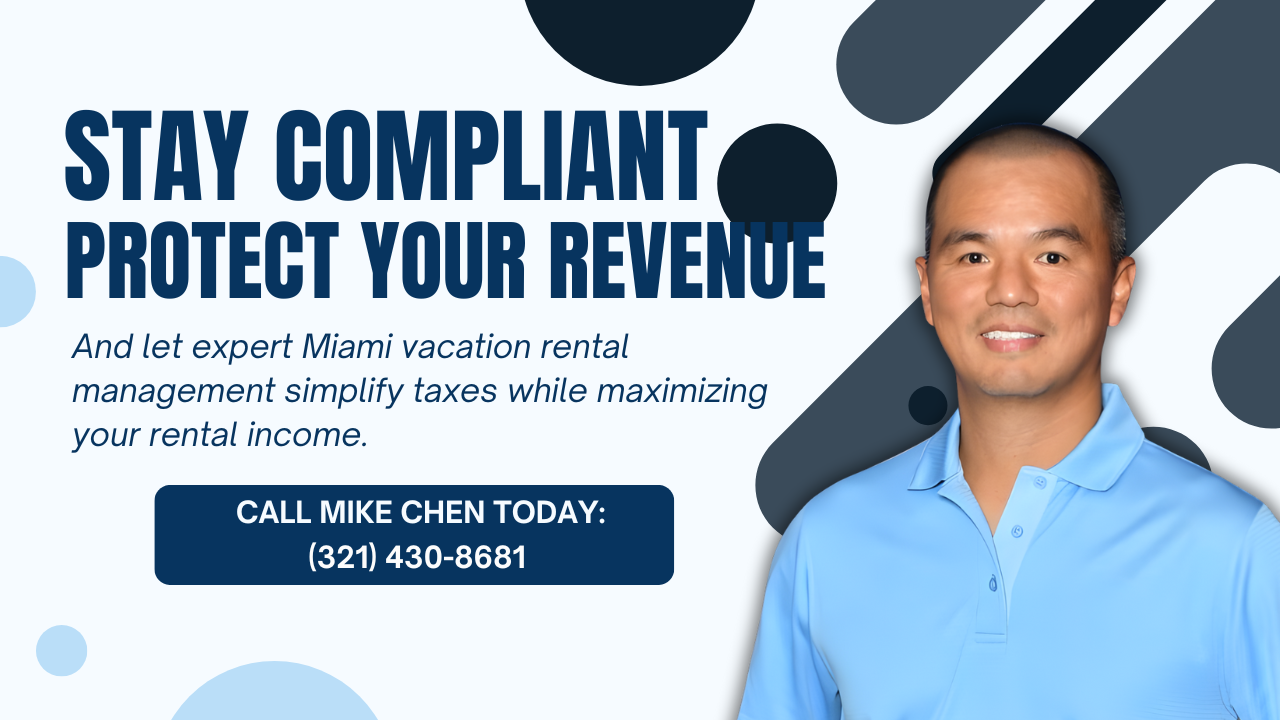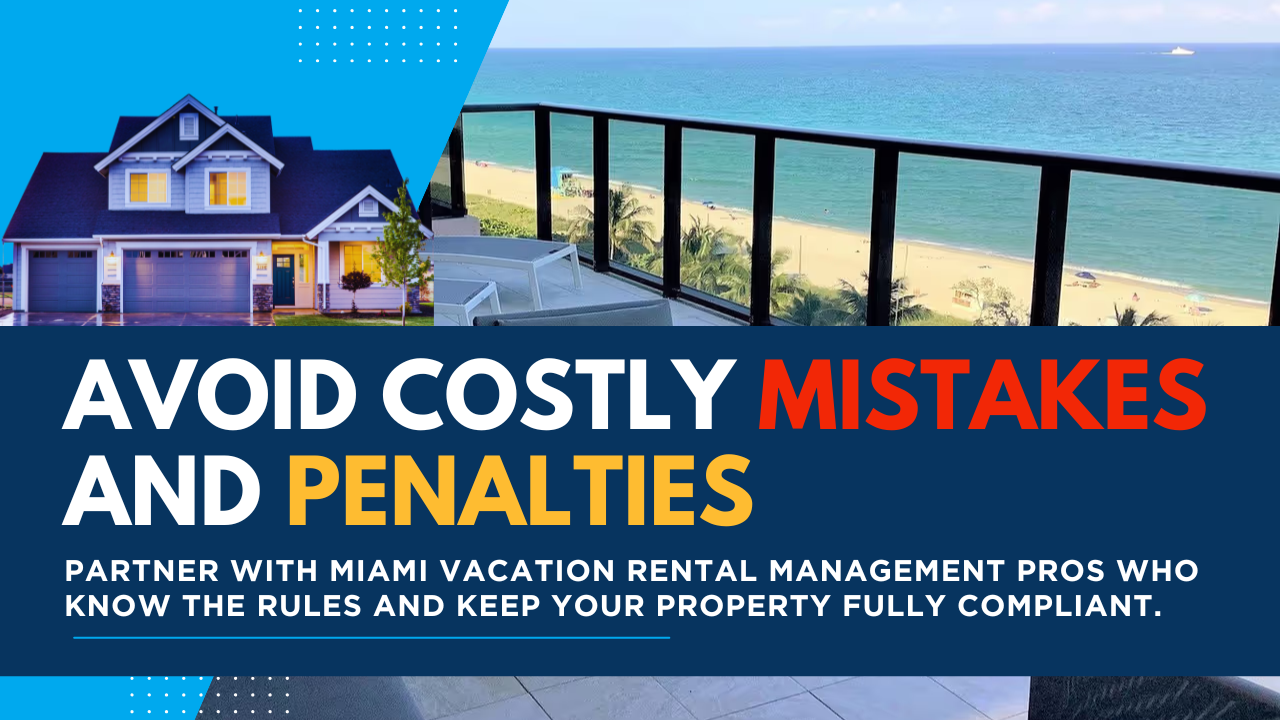
Running an Airbnb in Miami-Dade County comes with tax responsibilities that can feel overwhelming. Between state sales tax, county tourist taxes, and potentially city resort taxes, the compliance landscape is complex but manageable with the right guidance.
Whether you’re listing your first property or expanding your portfolio, understanding Miami-Dade tourist tax requirements protects your business and keeps you profitable.

Understanding Miami-Dade’s Multi-Layered Tax Structure
Miami-Dade County operates a comprehensive tax system for short-term rentals lasting six months or less. Your total tax obligation depends on your property’s location and booking channels.
State of Florida Requirements
- Sales/Transient Rental Tax: 6% on all stays under 6 months
- Administration: Florida Department of Revenue
- Filing: Monthly via Form DR-15
Miami-Dade County Taxes
The county imposes a combined 6% tax on short-term rentals:
- Convention Development Tax: 3% (most county areas)
- Tourist Development Room Tax: 2% (excludes Miami Beach, Surfside, Bal Harbour)
- Professional Sports Franchise Tax: 1% (excludes Miami Beach, Surfside, Bal Harbour)
City-Level Resort Taxes
Certain municipalities add their own taxes:
- Miami Beach: Additional 4% resort tax
- Surfside: Additional 4% resort tax
- Bal Harbour: Additional 4% resort tax
Your total tax rate ranges from 12% to 16% depending on location.
Platform Collection vs. Owner Responsibility
Understanding who collects what taxes is crucial for compliance.
Airbnb Tax Collection
Airbnb automatically collects and remits:
- ✅ 6% Florida state sales tax
- ✅ 6% Miami-Dade County taxes (except Miami Beach, Surfside, Bal Harbour)
- ❌ City resort taxes (except Surfside, where they have a special agreement)
What You Must Handle
Even with Airbnb’s collection, you’re responsible for:
- City resort taxes in Miami Beach and Bal Harbour
- All taxes on direct bookings
- All taxes from non-covered platforms (Booking.com, direct websites)
Mixed booking channels require full registration. If you accept even one direct booking, you must register for county tax accounts.

Registration Requirements Step-by-Step
Getting properly registered involves multiple agencies and documents. Here’s your roadmap:
Step 1: State Registration
- Apply for a Florida DR-1 sales tax number online
- Choose monthly filing initially (can adjust to quarterly later)
- Register at the Florida Department of Revenue
Step 2: Certificate of Use
Your property needs an annual Certificate of Use from Miami-Dade:
- Cost: $36.70 filing fee + $136.17 inspection fee
- Requirements: Property inspection, code compliance verification
- Renewal: Required annually
- Display: Must be prominently displayed in the rental unit
Step 3: Local Business Tax Receipt
Required in unincorporated Miami-Dade and most municipalities:
- Obtain before advertising your property
- Different categories for residential vs. commercial properties
- Contact your specific municipality for requirements
Step 4: County Tourist Tax Account
For properties with mixed booking channels:
- Email registration form to CTHelp@miamidade.gov
- Include Certificate of Use and supporting documents
- Enroll in TouristExpress system when the account number is assigned
Step 5: Municipal Resort Tax (if applicable)
Miami Beach properties require separate registration:
- Register with the City Finance Department
- Use ResortTax portal for monthly filings
- Certificate number must appear in all advertising
Filing and Payment Schedule
Miami-Dade operates on a strict monthly filing schedule.
Due Dates
- Tax payments due: 1st of each month
- Returns considered late: After the 20th
- Weekend/holiday rule: Due next business day if the 20th falls on a weekend
Collection Allowance
Earn 2.5% collection allowance (maximum $30) for:
- Electronic filing through TouristExpress
- On-time payment
- Proper documentation
Penalties for Late Filing
- Minimum penalty: $50 per month
- Late penalty: 10% per 30-day period (maximum 50%)
- Daily interest: Calculated at the current state rate
- Enforcement: Property liens and bank account freezes are possible
Common Compliance Scenarios
Scenario 1: Airbnb-Only Property in Brickell
Tax responsibility: None (Airbnb handles everything)
Action required: Maintain Certificate of Use and Local Business Tax Receipt
Scenario 2: Mixed Bookings in Wynwood
Airbnb bookings: Platform collects all taxes
Direct bookings: You collect and remit 12% total tax
Monthly filing: Required with breakdown by booking source
Scenario 3: Miami Beach Property
State and county: Collected by platforms
City resort tax: You must collect and remit 4% regardless of booking source
Monthly filing: Required through the Miami Beach ResortTax portal

Technology Solutions for Compliance
Property Management Systems
- Guesty: Only PMS with native Florida trust accounting
- Hostaway: Strong channel sync, requires Avalara integration
- Lodgify: Budget option, but limited automation
Tax Automation Tools
- Avalara MyLodgeTax: Integrates with TouristExpress API
- Stripe Tax: Configure custom jurisdiction rates
- Excel/Power Query: Build custom reporting for smaller operations
Audit Preparation and Red Flags
Miami-Dade conducts regular audits based on:
- Filing inconsistencies or missed returns
- Platform reporting mismatches
- Complaints from neighbors or competitors
- Properties without proper certificates
Record Keeping Requirements
Maintain for a minimum of 3 years:
- All booking confirmations and receipts
- Platform tax collection documentation
- Bank statements and payment records
- Guest registries with dates of stay
Common Audit Issues
- Missing Certificate of Use: Can trigger immediate inspection and escalating fines
- Airbnb tax double-charging: Ensure you don’t rebill platform-collected taxes as fees
- Six-month lease documentation: Back-dated leases discovered in audits result in full tax liability
Vacation Rental Professional Management Support
Navigating Miami-Dade’s complex tax requirements while maximizing your rental income requires local expertise and ongoing attention to detail.
At FunStay Miami, we handle all aspects of tax compliance for your vacation rental properties. Our local team understands the nuances of each municipality’s requirements and maintains relationships with county departments to resolve issues quickly.
We manage your Certificate of Use renewals, handle all tax registrations, and ensure your properties remain compliant while you focus on building your investment portfolio.
Take Action Today
Don’t let tax compliance slow down your vacation rental success. Book a Free Consultation with our Miami vacation rental management team to develop a compliance strategy that protects your investment and maximizes your rental income.

